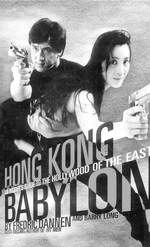

|

Inside The World Of Chinese Cinema.
By James DiGiovanna
THE CURRENT VOGUE for films from Hong Kong is probably
due at least in part to Quentin Tarantino, who stole scenes and
plots from Ringo Lam and John Woo. As a result, Tarantino lost
a lawsuit and John Woo got enough Hollywood attention to become
a major director in the West. Still, the average American movie-goer
knows little about this incredibly productive cinema, home of
the third largest movie industry in the world.
 This volume redresses that gap by providing a history of Hong
Kong (and other Cantonese) movie-making; interviews with 31 leading
filmmakers, actors and actresses; plot summaries of some of the
better and more influential Hong Kong films of the post-war period;
and "recommended viewing" lists from 12 critics.
This volume redresses that gap by providing a history of Hong
Kong (and other Cantonese) movie-making; interviews with 31 leading
filmmakers, actors and actresses; plot summaries of some of the
better and more influential Hong Kong films of the post-war period;
and "recommended viewing" lists from 12 critics.
 The best section is doubtless the interviews. It's refreshing
to hear the Cantonese cineastes speak for themselves, after all
the ink that fringe critics in the West have spilled over them.
Instead of the fanboy gushings one finds in zines like Asian Trash
Cinema (now called Asian Cult Cinema in an attempt at political
correctness, one supposes) the reader is treated here to the
stilted English of Jackie Chan, Sammo Hung, John Woo and Chow
Yun Fat as they explain the intricacies of their low-budget movie
world. Freely admitting their influences from the West, as well
as some more obscure Eastern sources, the filmmakers have a much
more approachable feel than their Hollywood counterparts. Perhaps
due to the language barrier, or perhaps because no one is more
phony than a Hollywood phony, the Hong Kong movie crowd seems
strangely down-to-earth.
The best section is doubtless the interviews. It's refreshing
to hear the Cantonese cineastes speak for themselves, after all
the ink that fringe critics in the West have spilled over them.
Instead of the fanboy gushings one finds in zines like Asian Trash
Cinema (now called Asian Cult Cinema in an attempt at political
correctness, one supposes) the reader is treated here to the
stilted English of Jackie Chan, Sammo Hung, John Woo and Chow
Yun Fat as they explain the intricacies of their low-budget movie
world. Freely admitting their influences from the West, as well
as some more obscure Eastern sources, the filmmakers have a much
more approachable feel than their Hollywood counterparts. Perhaps
due to the language barrier, or perhaps because no one is more
phony than a Hollywood phony, the Hong Kong movie crowd seems
strangely down-to-earth.
Writers Dannen and Long are also hip to the fact that there's
more to Hong Kong cinema than martial arts films and ultra-violent
gangster flicks, even though these take up most of the discussion
in the book, and most of the celluloid in Hong Kong. Still, there's
an interesting interview with Wong Kar Wai, the art-film director
whose Chungking Express was a cult hit in the U.S. without appealing
to the post-adolescent blood-and-bullets crowd.
Perhaps the zeitgeist of Hong Kong cinema is best summed up in
a quote by Tsui Hark, director of Peking Opera Blues and
the Swordsman series of martial arts movies, when he describes
Hong Kong as "very business, very crowded, very stink and
people very nervous."

|
 |





